Here are my favorite love poems that rhyme categorized:
- Short rhyming love poems
- Love poems that rhyme for a girl
- Rhyming love poems for your crush
- Love sonnets that rhyme
So if you want the best love poems that rhyme, then you’re in the right place.
Keep reading!
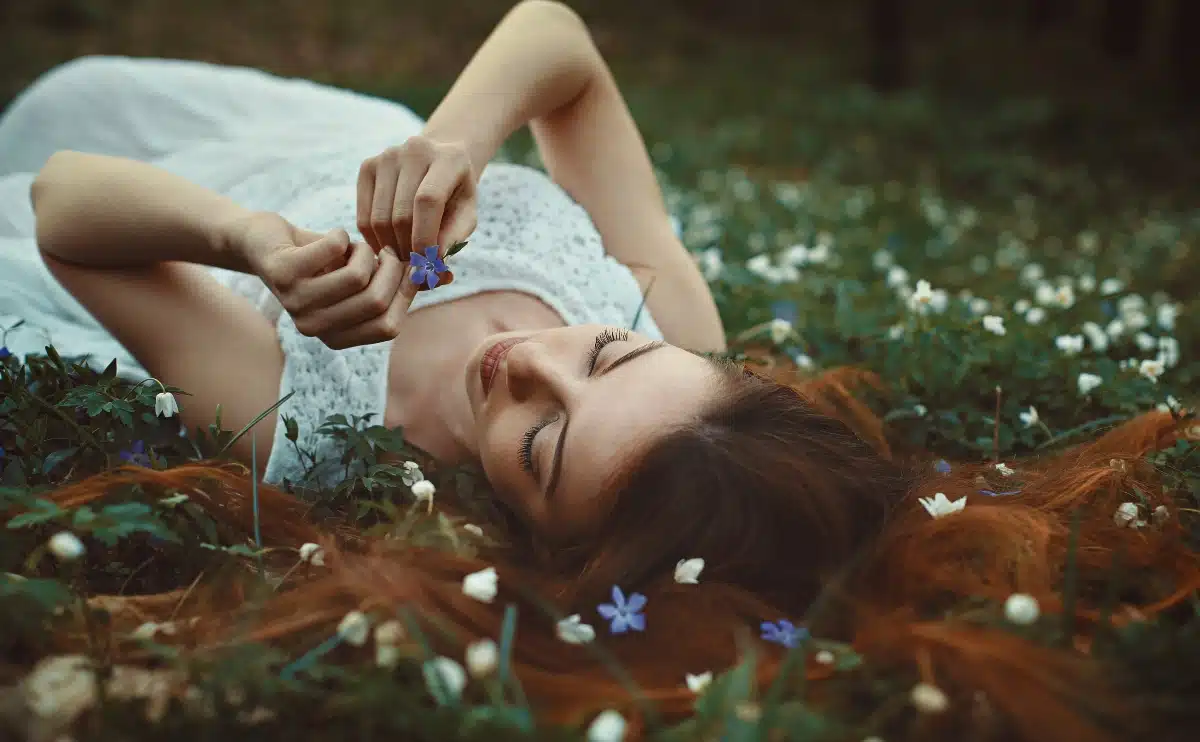
Melodic Love Poems That Rhyme
Discover the magic of love and rhyme with our selection of the best love poems that rhyme.
From short and sweet rhyming love poems to intricate love sonnets that play with rhyme and rhythm, you’ll find them all in one place here.
These poems are a testament to the beauty and power of rhyme in expressing the intensity of romantic love.
Immerse yourself in the enchanting world of love and rhyme, and let the poetic language transport you to a realm of emotion and passion.
Let’s jump right in!
My #1 Favorite Love Poem That Rhyme

“My Love” by Russell Powell Jacoby
My love is beautiful and sweet.
All good and gentle graces meet
In her, in loveliness complete.
My love is precious. Nor for me
In all this world on land or sea
Can other worthy treasure be.
My love is constant. In her eyes
True, pure, and steadfast, beauty lies
Serene and noble as the skies.
Short Rhyming Love Poems

“I Am Thine” by Anonymous
I am thine, thou art mine,
And this shall be a sure sign:
Locked fast thou art
Within my heart,
And lost forever is the key;
So thou inside must ever be.
“Ecstasy” by Friedrich Rückert
Oh, thou my soul, oh, thou my heart,
Thou my delight, my pain thou art!
Oh, thou my world in which I move,
My heaven where I soar above,
Oh, thou the tomb to which I gave
Forever all my sorrow grave.
Thou art my peace, thou art my rest,
With thee, thou heaven, I am blessed.
Thy love endows me in mine eyes,
Thy glance my own life glorifies.
Through thee above myself I fly,
My guiding spirit, my better I!
From “A Dream of Love” by Walter von der Vogelweide
Look, this is why I feel so gay:
I have grown warm with cheer,
Clasped by a dream so dear.
Alas, I had to wake, for it was day.
Hear what she has done unto me:
All the summer I must peer
Into ladies’ eyes to see
If I can find my dear: then sorrow’s end were near.
Maybe she is going to this dance.
Ladies, I beg you, be so kind,
Push back your hats, if you don’t mind!
If I should find her ’neath this wreath by chance!

“Thou Seemest Like a Flower” by Heinrich Heine
Thou seemest like a flower,
So fair and pure thou art;
I look on thee and sadness
Comes stealing through my heart.
And now I feel like resting
My hands upon thy hair,
Praying that God may keep thee
So lovely, pure and fair.
“A Dream” by Stephen Phillips
My dead love came to me, and said:
‘God gives me one hour’s rest,
To spend with thee on earth again:
How shall we spend it best?’
‘Why, as of old,’ I said; and so
We quarrelled, as of old:
But, when I turned to make my peace,
That one short hour was told.
“Beauty’s a Flower” by Moira O’Neill
Youth’s for an hour,
Beauty’s a flower,
But love is the jewel that wins the world.
Youth’s for an hour, an’ the taste o’ life is sweet,
Ailes was a girl that stepped on two bare feet;
In all my days I never seen the one as fair as she,
I’d have lost my life for Ailes, an’ she never cared for me.
Beauty’s a flower, an’ the days o’ life are long,
There’s little knowin’ who may live to sing another song;
For Ailes was the fairest, but another is my wife,
An’ Mary—God be good to her!—is all I love in life.
Youth’s for an hour,
Beauty’s a flower,
But love is the jewel that wins the world.

“The Lotus Flower” by Heinrich Heine
The lotus flower trembles
In fear of the sunshine bright,
And with her head cast downward
Waits dreaming for the night.
She is waked by the moon, her lover,
By moonbeams’ light embrace,
And she unveils in kindness
Her gentle flower face.
She blooms and glows and shining
All silent looks above:
With tears and fragrance she trembles
In love and the woe of love.
“Is Love, then, So Simple” by Irene Rutherford Mcleod
Is love, then, so simple my dear?
The opening of a door,
And seeing all things clear?
I did not know before.
I had thought it unrest and desire
Soaring only to fall,
Annihilation and fire:
It is not so at all.
I feel no desperate will,
But I think I understand
Many things, as I sit quite still,
With Eternity in my hand.
“I Dreamed a Princess Came to Me” by Heinrich Heine
I dreamed a princess came to me
With pale and tearful face.
We sat beneath the linden tree
In lovers’ fond embrace.
“I do not want thy father’s throne,
Nor yet his sceptre of gold,
His diamond crown I would not own—
Thee, fairest, I want to hold.”
“That may not be,” she spake to me,
“I lie in my grave below—
Only at night I come to thee,
Because I love thee so.”
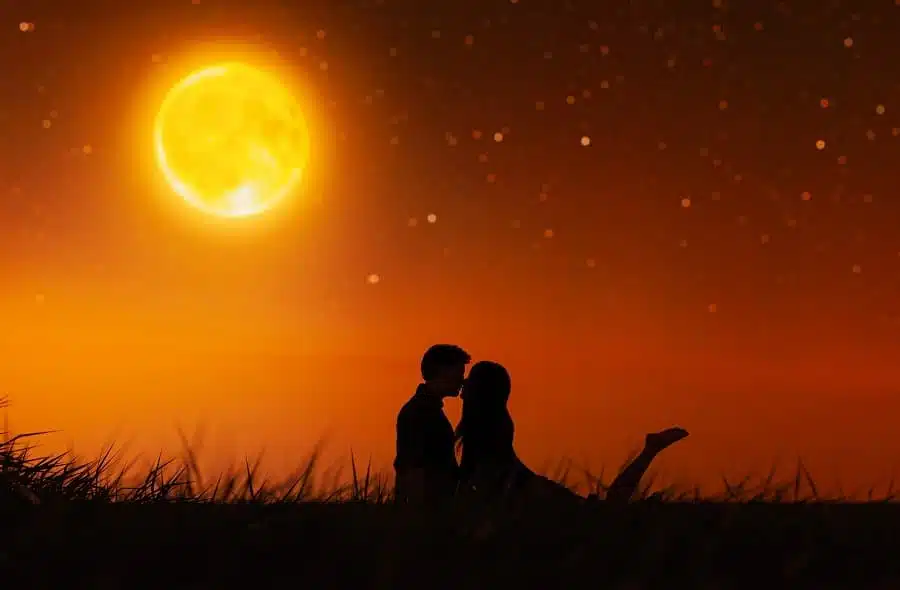
“The Moon” by William H. Davies
Thy beauty haunts me heart and soul,
Oh, thou fair Moon, so close and bright;
Thy beauty makes me like the child
That cries aloud to own thy light:
The little child that lifts each arm
To press thee to her bosom warm.
Though there are birds that sing this night
With thy white beams across their throats,
Let my deep silence speak for me
More than for them their sweetest notes:
Who worships thee till music fails,
Is greater than thy nightingales.
“Romance” by Robert Louis Stevenson
I will make you brooches and toys for your delight
Of bird-song at morning and star-shine at night.
I will make a palace fit for you and me,
Of green days in forests and blue days at sea.
I will make my kitchen, and you shall keep your room,
Where white flows the river and bright blows the broom,
And you shall wash your linen and keep your body white
In rainfall at morning and dewfall at night.
And this shall be for music when no one else is near,
The fine song for singing, the rare song to hear!
That only I remember, that only you admire,
Of the broad road that stretches and the roadside fire.
“Song” by William Watson
April, April,
Laugh thy girlish laughter;
Then, the moment after,
Weep thy girlish tears,
April, that mine ears
Like a lover greetest,
If I tell thee, sweetest,
All my hopes and fears.
April, April,
Laugh thy golden laughter,
But, the moment after,
Weep thy golden tears!

“To Olivia” by Francis Thompson
I fear to love thee, Sweet, because
Love’s the ambassador of loss;
White flake of childhood, clinging so
To my soiled raiment, thy shy snow
At tenderest touch will shrink and go.
Love me not, delightful child.
My heart, by many snares beguiled,
Has grown timorous and wild.
It would fear thee not at all,
Wert thou not so harmless-small.
Because thy arrows, not yet dire,
Are still unbarbed with destined fire,
I fear thee more than hadst thou stood
Full-panoplied in womanhood.
“Song” by Anna Wickham
I was so chill, and overworn, and sad,
To be a lady was the only joy I had.
I walked the street as silent as a mouse,
Buying fine clothes, and fittings for the house.
But since I saw my love
I wear a simple dress,
And happily I move
Forgetting weariness.
“My Songs Are All of Thee” by Richard Watson Gilder
My songs are all of thee, what though I sing
Of morning when the stars are yet in sight,
Of evening, or the melancholy night,
Of birds that o’er the reddening waters wing;
Of song, of fire, of winds, or mists that cling
To mountain-tops, of winter all in white,
Of rivers that toward ocean take their flight,
Of summer when the rose is blossoming.
I think no thought that is not thine, no breath
Of life I breathe beyond thy sanctity;
Thou art the voice that silence uttereth,
And of all sound thou art the sense. From thee
The music of my song, and what it saith
Is but the beat of thy heart, throbbed through me.

“The Lover’s Year” by George Parsons Lathrop
Thou art my morning, twilight, noon, and eve,
My Summer and my Winter, Spring and Fall;
For Nature left on thee a touch of all
The moods that come to gladden or to grieve
The heart of Time, with purpose to relieve
From lagging sameness. So do these forestall
In thee such o’erheaped sweetnesses as pall
Too swiftly, and the taster tasteless leave.
Scenes that I love, to me always remain
Beautiful, whether under summer’s sun
Beheld, or, storm-dark, stricken across with rain.
So, through all humors thou ’rt the same, sweet one:
Doubt not I love thee well in each, who see
Thy constant change is changeful constancy.
“Eternal” by Carlotta Perry
Love is eternal, so the strong souls say,
But seeing how hard life doth give the lie
Unto the mighty words, with sneer or sigh,
The weaker ones cry out in sad dismay
That love is changeful as an April day,
Holding within itself no strength whereby
It can the subtle shafts of time defy,
And in the heart of man abide alway.
Not every heart is great enough to hold
A great immortal tenant. Love hath fled
Always from natures narrow, weak and cold.
Know, when by scornful lips you hear it said
That Love is traitor, that the truth is told
Not of dear Love, but of that soul instead.
“I Love Thee—Not Because Thy Love for Me” by Maria (White) Lowell
I love thee—not because thy love for me,
Like a great sunrise, did o’ervault my day
With purple light, and wrought upon my way
The morning dew in fresh emblazonry;
Nor that thou seest all I fain would be
And thus dost call me by mine angel’s name,
While still my woman’s heart beats free of blame
Beneath the shelter of thy charity.
Oh! no, for wearily upon my soul
Would weigh thy golden crown of unbought praise,
Did I not look beyond the hour’s control,
To where those fruits of perfect virtue raise
Their bloom, that thou ere-while with prophet eyes
Didst name mine own, in groves of paradise.
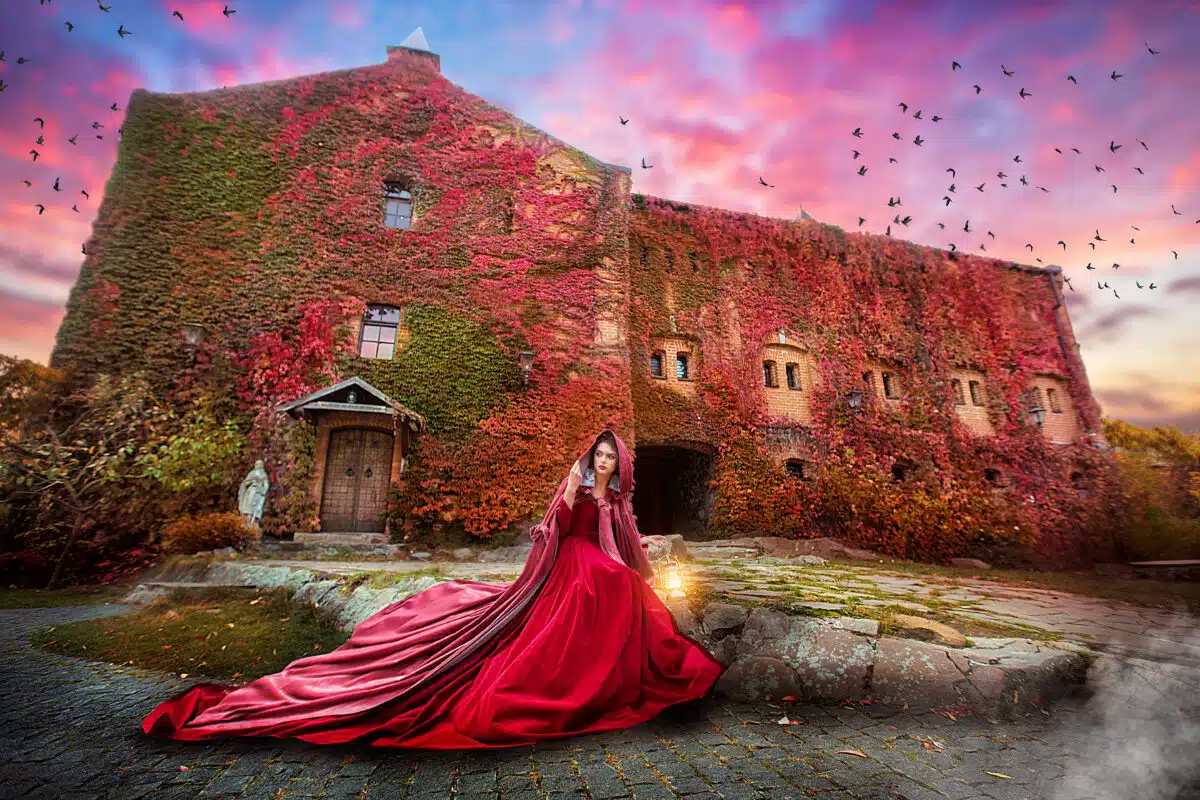
“When She Comes Home” by James Whitcomb Riley
When she comes home again! A thousand ways
I fashion, to myself, the tenderness
Of my glad welcome: I shall tremble—yes;
And touch her as when first in the old days
I touched her girlish hand, nor dared upraise
Mine eyes, such was my faint heart’s sweet distress.
Then silence, and the perfume of her dress:
The room will sway a little, and a haze
Cloy eyesight—soulsight, even—for a space:
And tears—yes; and the ache here in the throat,
To know that I so ill deserve the place
Her arms make for me; and the sobbing note
I stay with kisses, ere the tearful face
Again is hidden in the old embrace.
“Love’s Meaning” by Carlotta Perry
I thought it meant all glad ecstatic things,
Fond glance and touch and speech, quick blood and brain,
And strong desire, and keen, delicious pain,
And beauty’s thrall, and strange bewilderings
’Twixt hope and fear, like to the little stings
The rose-thorn gives, and then the utter gain—
Worth all my sorest striving to attain—
Of the dear bliss long-sought possession gives.
Now with a sad, clear sight that reassures
My often sinking soul, with longing eyes
Averted from the path that still allures,
Lest, seeing that for which my sore heart sighs,
I seek my own good at the cost of yours,—
I know at last that love means sacrifice.
“Eros” by Ralph Waldo Emerson
The sense of the world is short, —
Long and various the report,
To love and be beloved ;
Men and gods have not outlearned it ;
And, how oft soe’er they’ve turned it,
‘Tis not to be improved.
Love Poems That Rhyme for a Girl

“Immortal Love” by George Edward Woodberry
Immortal love, too high for my possessing,—
Yet, lower than thee, where shall I find repose?
Long in my youth I sang the morning rose,
By earthly things the heavenly pattern guessing!
Long fared I on, beauty and love caressing,
And finding in my heart a place for those
Eternal fugitives; the golden close
Of evening folds me, still their sweetness blessing.
Oh happy we, the first-born heirs of nature,
For whom the Heavenly Sun delays his light!
He by the sweets of every mortal creature
Tempers eternal beauty to our sight;
And by the glow upon love’s earthly feature
Maketh the path of our departure bright.
“The Last So Sweet, so Balmy, so Delicious!” by Richard Linche
The last so sweet, so balmy, so delicious!
lips, breath, and tongue, which I delight to drink on:
The first so fair, so bright, so purely precious!
brow, eyes, and cheeks, which still I joy to think on;
But much more joy to gaze, and aye to look on.
those lily rounds which ceaseless hold their moving,
From whence my prisoned eyes would ne’er be gone;
which to such beauties are exceeding loving.
O that I might but press their dainty swelling!
and thence depart, to which must now be hidden,
And which my crimson verse abstains from telling;
because by chaste ears, I am so forbidden.
There, in the crystal-pavèd Vale of Pleasure,
Lies lockèd up, a world of richest treasure.
“For I Have Loved Long, I Crave Reward!” by Bartholomew Griffin
For I have lovèd long, I crave reward!
Reward me not unkindly! Think on kindness!
Kindness becometh those of high regard;
Regard with clemency a poor man’s blindness!
Blindness provokes to pity, when it crieth;
It crieth “Give!” Dear Lady, shew some pity!
Pity, or let him die, that daily dieth!
Dieth he not oft, who often sings this ditty?
This ditty pleaseth me, although it choke me.
Methinks, dame ECHO weepeth at my moaning,
Moaning the woes, that to complain provoke me.
Provoke me now no more; but hear my groaning!
Groaning both day and night, doth tear my heart:
My heart doth know the cause, and triumphs in the smart.

“Kissing Her Hair” by Algernon Charles Swinburne
Kissing her hair, I sat against her feet:
Wove and unwove it,—wound, and found it sweet:
Made fast therewith her hands, drew down her eyes,
Deep as deep flowers, and dreamy like dim skies;
With her own tresses bound, and found her fair,—
Kissing her hair.
Sleep were no sweeter than her face to me,—
Sleep of cold sea-bloom under the cold sea:
What pain could get between my face and hers?
What new sweet thing would Love not relish worse?
Unless, perhaps, white Death had kissed me there,—
Kissing her hair.
“Serenade” by Henry Wadsworth Longfellow
Stars of the summer night!
Far in yon azure deeps,
Hide, hide your golden light!
She sleeps!
My lady sleeps!
Sleeps!
Moon of the summer night!
Far down yon western steeps,
Sink, sink in silver light!
She sleeps!
My lady sleeps!
Sleeps!
Wind of the summer night!
Where yonder woodbine creeps,
Fold, fold thy pinions light!
She sleeps!
My lady sleeps!
Sleeps!
Dreams of the summer night!
Tell her, her lover keeps
Watch, while in slumbers light
She sleeps!
My lady sleeps!
Sleeps!
“What She Can Be So Cruel as My Love” by Richard Linche
What She can be so cruel as my Love,
or bear a heart so pitiless as She?
Whom love, looks, words, tears, prayers do not move;
nor sighs, nor vows prevail to pity me.
She calls my love, “a SINON to her heart!”
“my looks,” she saith, “are like the crocodile’s!”
“My words the Sirens sing, with guileful art!”
tears, “CIRCE’s floods!” sighs, vows, “deceitful guiles!”
But my poor heart hath no interpreter
but love, looks, words, tears, prayers, sighs, or vows!
Then must it die! sith She, my comforter,
whate’er I do, nor liketh, nor allows.
With TITIUS, thus the vulture Sorrow eats me!
With steel-twigged rods, thus tyrant CUPID beats me!

“My Beautiful Lady” by Thomas Woolner
I love my Lady; she is very fair;
Her brow is wan, and bound by simple hair;
Her spirit sits aloof, and high,
But glances from her tender eye
In sweetness droopingly.
As a young forest while the wind drives through,
My life is stirred when she breaks on my view;
Her beauty grants my will no choice
But silent awe, till she rejoice
My longing with her voice.
Her warbling voice, though ever low and mild,
Oft makes me feel as strong wine would a child;
And though her hand be airy light
Of touch, it moves me with its might,
As would a sudden fright.
A hawk high poised in air, whose nerved wing-tips
Tremble with might suppressed, before he dips,
In vigilance, scarce more intense
Than I, when her voice holds my sense
Contented in suspense.
Her mention of a thing, august or poor,
Makes it far nobler than it was before:
As where the sun strikes life will gush,
And what is pale receive a flush,
Rich hues, a richer blush.
My Lady’s name, when I hear strangers use,
Not meaning her, to me sounds lax misuse;
I love none but my Lady’s name;
Maud, Grace, Rose, Marian, all the same
Are harsh, or blank and tame.
My Lady walks as I have watched a swan
Swim where a glory on the water shone:
There ends of willow branches ride,
Quivering in the flowing tide,
By the deep river’s side.
Fresh beauties, howsoe’er she moves, are stirred:
As the sunned bosom of a humming bird
At each pant lifts some fiery hue,
Fierce gold, bewildering green or blue;
The same, yet ever new.
“My Sweet Sweeting” by Anonymous
Ah, my sweet sweeting;
My little pretty sweeting,
My sweeting will I love wherever I go;
She is so proper and pure,
Full, steadfast, stable, and demure,
There is none such, you may be sure,
As my sweet sweeting.
In all this world, as thinketh me,
Is none so pleasant to my ee,
That I am glad so oft to see,
As my sweet sweeting.
When I behold my sweeting sweet,
Her face, her hands, her minion feet,
They seem to me there is none so mete,
As my sweet sweeting.
Above all other praise must I,
And love my pretty pygsnye,
For none I find so womanly
As my sweet sweeting.
“When Your Beauty Appears” by Thomas Parnell
“When your beauty appears,
In its graces and airs,
All bright as an angel new dropt from the skies,
At distance I gaze, and am awed by my fears,
So strangely you dazzle my eyes!
“But when without art
Your kind thoughts you impart,
When your love runs in blushes through every vein,
When it darts from your eyes, when it pants at your heart,
Then I know that you ’re woman again.”
“There ’s a passion and pride
In our sex,” she replied;
“And thus (might I gratify both) I would do,—
Still an angel appear to each lover beside,
But still be a woman to you.”
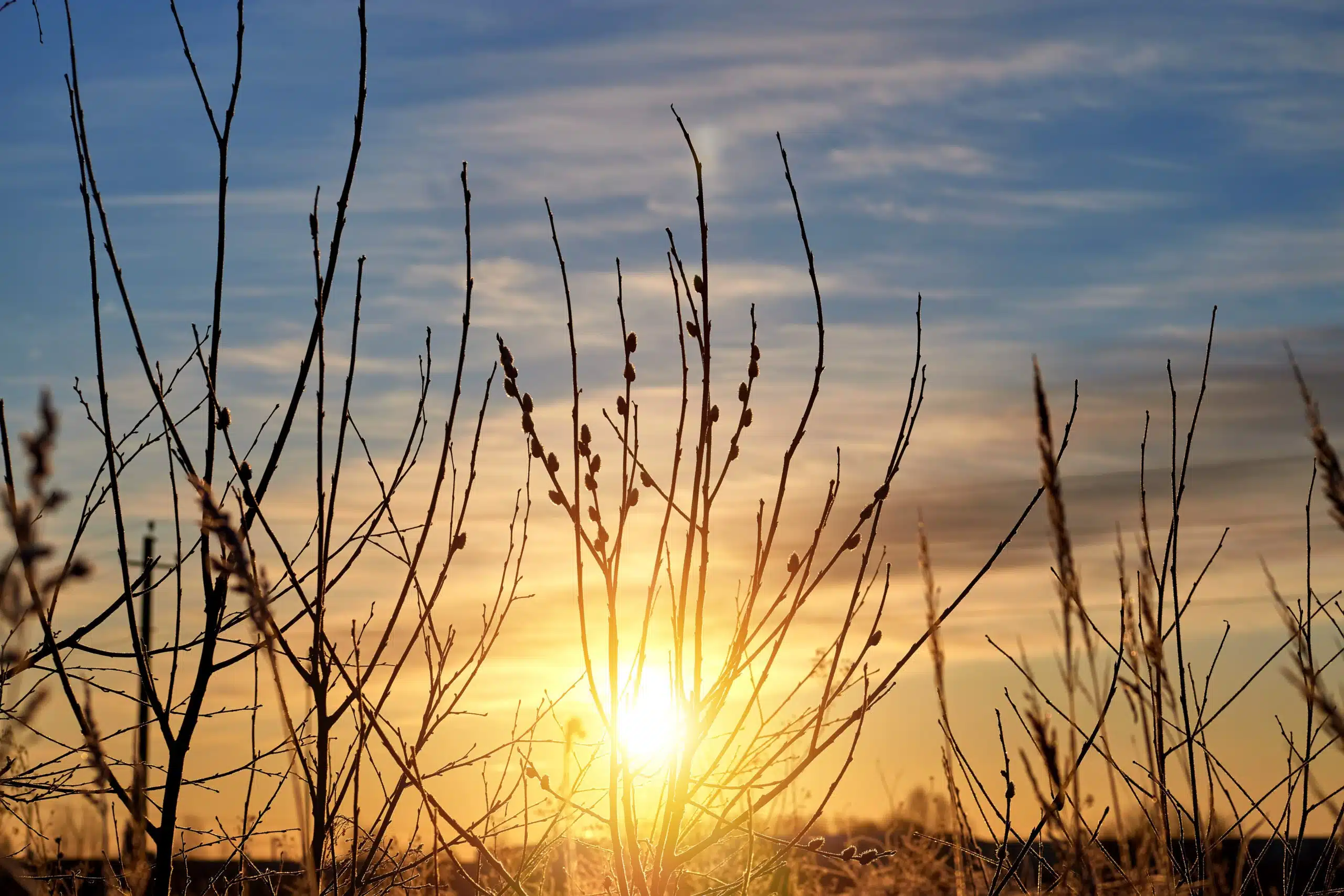
“So Sweet Love Seemed” by Robert Bridges
So sweet love seemed that April morn,
When first we kissed beside the thorn,
So strangely sweet, it was not strange
We thought that love could never change.
But I can tell—let truth be told—
That love will change in growing old;
Though day by day is naught to see,
So delicate his motions be.
And in the end ’t will come to pass
Quite to forget what once he was,
Nor even in fancy to recall
The pleasure that was all in all.
His little spring, that sweet we found,
So deep in summer floods is drowned,
I wonder, bathed in joy complete,
How love so young could be so sweet.
“Love’s Young Dream” by Thomas Moore
O the days are gone when beauty bright
My heart’s chain wove!
When my dream of life, from morn till night,
Was love, still love!
New hope may bloom,
And days may come,
Of milder, calmer beam,
But there ’s nothing half so sweet in life
As love’s young dream!
O, there ’s nothing half so sweet in life
As love’s young dream!
Though the bard to purer fame may soar,
When wild youth ’s past;
Though he win the wise, who frowned before,
To smile at last;
He ’ll never meet
A joy so sweet
In all his noon of fame
As when first he sung to woman’s ear
His soul-felt flame,
And at every close she blushed to hear
The one loved name!
O, that hallowed form is ne’er forgot,
Which first love traced;
Still it lingering haunts the greenest spot
On memory’s waste!
’T was odor fled
As soon as shed;
’T was morning’s wingèd dream;
’T was a light that ne’er can shine again
On life’s dull stream!
O, ’t was a light that ne’er can shine again
On life’s dull stream!
“O Let My Heart, My Body, and My Tongue” by Bartholomew Griffin
O let my heart, my body, and my tongue
Bleed forth the lively streams of faith unfeigned!
Worship my saint, the gods and saints among!
Praise and extol her fair, that me hath pained!
O let the smoke of my suppressed Desire,
Raked up in ashes of my burning breast,
Break out at length, and to the clouds aspire,
Urging the heavens t’afford me rest!
But let my body naturally descend
Into the bowels of our common mother!
And to the very centre let it wend,
When it no lower can, her griefs to smother!
And yet when I so low do buried lie;
Then shall my love ascend unto the sky!
Rhyming Love Poems For Your Crush

“The Nature of Love” by Guido Guinizelli
To noble heart Love doth for shelter fly,
As seeks the bird the forest’s leafy shade;
Love was not felt till noble heart beat high,
Nor before love the noble heart was made.
Soon as the sun’s broad flame
Was formed, so soon the clear light filled the air;
Yet was not till he came:
So love springs up in noble breasts, and there
Has its appointed space,
As heat in the bright flames finds its allotted place.
Kindles in noble heart the fire of love,
As hidden virtue in the precious stone:
This virtue comes not from the stars above,
Till round it the ennobling sun has shone;
But when his powerful blaze
Has drawn forth what was vile, the stars impart
Strange virtue in their rays;
And thus when Nature doth create the heart
Noble and pure and high,
Like virtue from the star, love comes from woman’s eye.
“Lover’s Rock” by Henry Wadsworth Longfellow
There is a love that cannot die!—
And some their doom have met
Heart-broken—and gone as stars go by,
That rise, and burn, and set.
Their days were in Spring’s fallen leaf—
Tender—and young—and bright—and brief.
There is a love that cannot die!—
Aye—it survives the grave;
When life goes out with many a sigh,
And earth takes what it gave,
Its light is on the home of those
That heed not when the cold wind blows.
With us there are sad records left
Of life’s declining day:
How true hearts here were broken and cleft,
And how they passed away.
And yon dark rock that swells above
Its blue lake—has a tale of love.
’T is of an Indian maid, whose fate
Was saddened by the burst
Of passion, that made desolate
The heart it filled at first.
Her lover was false-hearted,—yet
Her love she never could forget.
It was a summer-day, and bright
The sun was going down:
The wave lay blushing in rich light
Beneath the dark rock’s frown,
And under the green maple’s shade
Her lover’s bridal feast was made.
She stood upon the rocky steep,
Grief had her heart unstrung,
And far across the lake’s blue sweep
Was heard the dirge she sung.
It ceased—and in the deep cold wave
The Indian Girl has made her grave.
“Irish Love Song” by Margaret Widdemer
Well, if the thing is over, better it is for me,
The lad was ever a rover, loving and laughing free,
Far too clever a lover not to be having still
A lass in the town and a lass by the road and a lass by the farther hill
Love on the field and love on the path and love in the woody glen—
(Lad, will I never see you, never your face again?)
Ay, if the thing is ending, now I’ll be getting rest,
Saying my prayers and bending down to be stilled and blest,
Never the days are sending hope till my heart is sore
For a laugh on the path and a voice by the gate and a step on the shieling floor—
Grief on my ways and grief on my work and grief till the evening’s dim—
(Lord, will I never hear it, never a sound of him?)
Sure if it’s done forever, better for me that’s wise,
Never the hurt, and never tears in my aching eyes,
No more the trouble ever to hide from my asking folk
Beat of my heart at click o’ the latch, and throb if his name is spoke;
Never the need to hide the sighs and the flushing thoughts and the fret,
And after awhile my heart will hush and my hungering hands forget
Peace on my ways, and peace in my step, and maybe my heart grown light
(Mary, helper of heartbreak, send him to me to-night!)

“Love’s Ritual” by Charles Hanson Towne
Breathe me the ancient words when I shall find
Your spirit mine; if, seeking you, life wins
New wonder, with old splendor let us bind
Our hearts when Love’s high sacrament begins.
Exalt my soul with pomp and pageantry,
Sing the eternal songs all lovers sing;
Yea, when you come, gold let our vestments be,
And lamps of silver let us softly swing.
But if at last, (hark how I whisper, Love!)
You from my temple and from me should turn,
I pray you chant no psalm my grief above,
Over the body of Pain let no light burn.
Go forth in silence, quiet as a dove,
Drift, with no sign, from our exultant place;
We need no Ite at the death of Love,
And none should come to look on Love’s white face.
“Love Triumphant” by Frederic Lawrence Knowles
Helen’s lips are drifting dust;
Ilion is consumed with rust;
All the galleons of Greece
Drink the ocean’s dreamless peace;
Lost was Solomon’s purple show
Restless centuries ago;
Stately empires wax and wane—
Babylon, Barbary, and Spain;—
Only one thing, undefaced,
Lasts, though all the worlds lie waste
And the heavens are overturned.
Dear, bow long ago we learned!
There’s a sight that blinds the sun,
Sound that lives when sounds are done,
Music that rebukes the birds,
Language lovelier than words,
Hue and scent that shame the rose,
Wine no earthly vineyard knows,
Silence stiller than the shore
Swept by Charon’s stealthy oar,
Ocean more divinely free
Than Pacific’s boundless sea,—
Ye who love have learned it true.
Dear, how long ago we knew!
“That Day You Came” by Lizette Woodworth Reese
Such special sweetness was about
That day God sent you here,
I knew the lavender was out,
And it was mid of year.
Their common way the great winds blew,
The ships sailed out to sea;
Yet ere that day was spent I knew
Mine own had come to me.
As after song some snatch of tune
Lurks still in grass or bough,
So, somewhat of the end o’ June
Lurks in each weather now.
The young year sets the buds astir,
The old year strips the trees;
But ever in my lavender
I hear the brawling bees.

“Ah, When He Is Mine” by Novalis (Pseud. for Friedrich von Hardenberg)
Ah, when He is mine,
When I hold Him fast,
When His loyalty divine
Fills my heart unto the last—
I feel no distress,
Only worship, love and happiness.
Ah, when He is mine,
Gladly I leave all,
Rise and wander at His sign,
Faithful to my Master’s call.
Let the others go
On the broad and lighted roads they know.
Ah, when He is mine,
I can sleep in calm,
Ever cheering me like wine
Is His heart’s sweet healing balm,
Holding us in thrall,
Gently soothing, penetrating all.
Ah, when He is mine,
Then the world’s mine, too;
As a seraph at her shrine
Holds the Virgin’s veil of blue—
Blissful, I adore,
Earthly things can frighten me no more.
Ah, where He is mine,
Is my fatherland;
Like my share, each gift divine
Gently falls into my hand.
Friends who went astray
Now I find disciples on His way.
“Aubade” by Sir William Davenant
The lark now leaves his wat’ry nest,
And climbing shakes his dewy wings.
He takes this window for the East,
And to implore your light he sings—
Awake, awake! the morn will never rise
Till she can dress her beauty at your eyes.
The merchant bows unto the seaman’s star,
The ploughman from the sun his season takes;
But still the lover wonders what they are
Who look for day before his mistress wakes.
Awake, awake! break thro’ your veils of lawn!
Then draw your curtains, and begin the dawn!
“Matin-Song” by John Heywood
Pack clouds, away, and welcome, day!
With night we banish sorrow.
Sweet air, blow soft; mount, lark, aloft
To give my Love good-morrow!
Wings from the wind to please her mind,
Notes from the lark I’ll borrow:
Bird, prune thy wing, nightingale, sing;
To give my Love good-morrow!
To give my Love good-morrow
Notes from them all I’ll borrow.
Wake from thy nest, robin red-breast,
Sing birds in every furrow,
And from each bill let music shrill
Give my fair Love good-morrow!
Blackbird and thrush in every bush,
Stare, linnet, and cocksparrow,
You pretty elves, amongst yourselves
Sing my fair Love good-morrow;
To give my Love good-morrow,
Sing, birds, in every furrow.
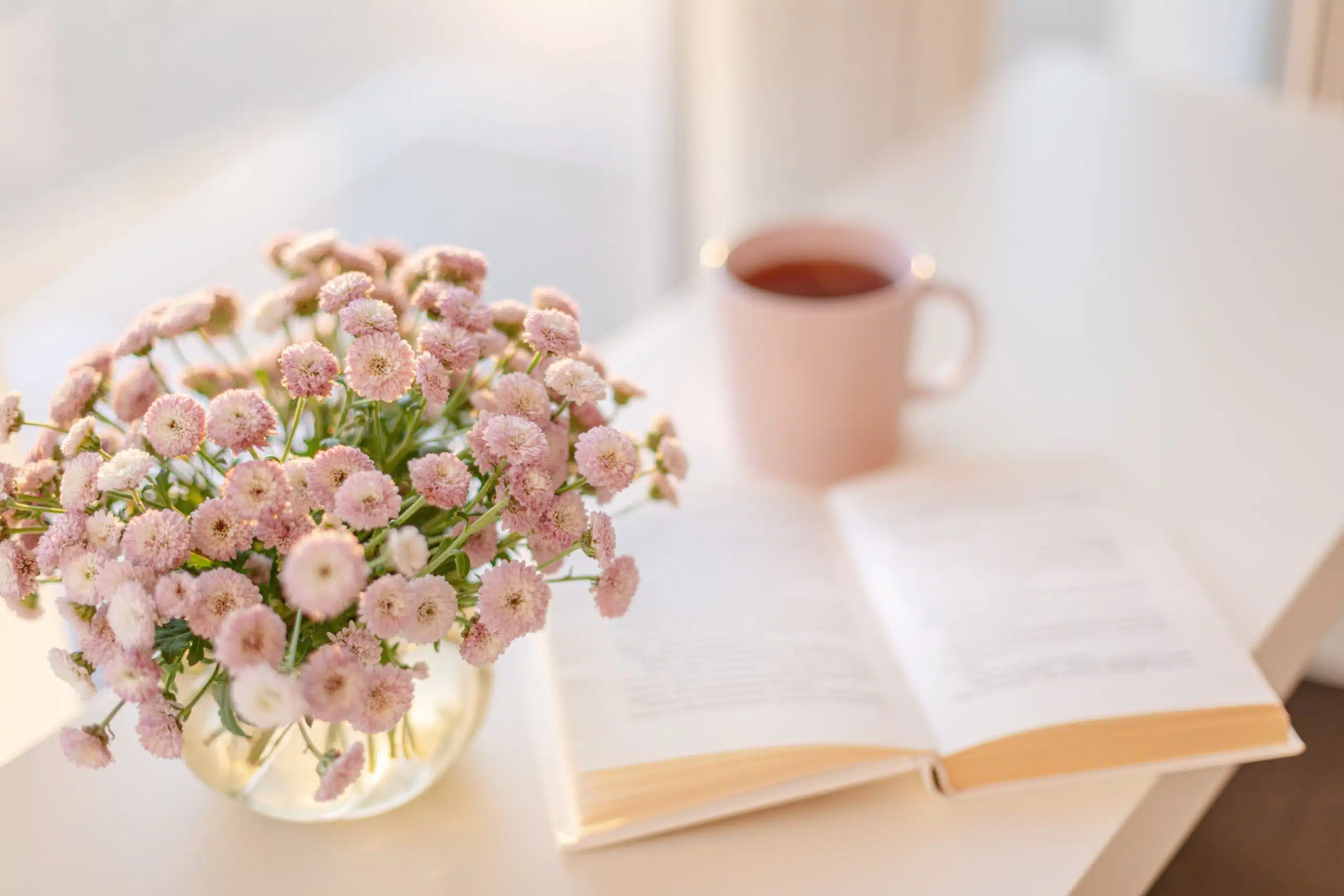
“On a Fair Morning” by Anonymous
On a fair morning, as I came by the way,
Met I with a merry maid in the merry month of May;
When a sweet love sings his lovely lay
And every bird upon the bush bechirps it up so gay:
With a heave and a ho! with a heave and a ho!
Thy wife shall be thy master, I trow.
Sing, care away, care away, let the world go!
Hey, lustily all in a row, all in a row,
Sing, care away, care away, let the world go!
“Stay, O Sweet” by John Donne
Stay, O sweet, and do not rise!
The light that shines comes from thine eyes;
The day breaks not: it is my heart,
Because that you and I must part.
Stay! or else my joys will die,
And perish in their infancy.
’Tis true, ’tis day: what though it be?
O, wilt thou therefore rise from me?
Why should we rise because ’tis light?
Did we lie down because ’twas night?
Love, which in spite of darkness brought us hither,
Should in despite of light keep us together.
Light hath no tongue, but is all eye.
If it could speak as well as spy,
This were the worst that it could say:—
That, being well, I fain would stay,
And that I lov’d my heart and honour so,
That I would not from him, that had them, go.
Must business thee from hence remove?
Oh, that’s the worse disease of love!
The poor, the fool, the false, love can
Admit, but not the busied man.
He, which hath business, and makes love, doth do
Such wrong, as when a married man doth woo.
“Beauty, Sweet Love, Is Like the Morning Dew” by Samuel Daniel
Beauty, sweet Love, is like the morning dew,
Whose short refresh upon the tender green
Cheers for a time, but till the sun doth shew,
And straight ’tis gone as it had never been.
Soon doth it fade that makes the fairest flourish,
Short is the glory of the blushing rose;
The hue which thou so carefully dost nourish,
Yet which at length thou must be forced to lose.
When thou, surcharged with burthen of thy years,
Shalt bend thy wrinkles homeward to the earth,
And that, in Beauty’s Lease expired, appears
The Date of Age, the Kalends of our Death—
But ah! no more!—this must not be foretold,
For women grieve to think they must be old.

“Fair Is My Love for April’s in Her Face” by Robert Greene
Fair is my love for April’s in her face:
Her lovely breasts September claims his part,
And lordly July in her eyes takes place,
But cold December dwelleth in her heart;
Blest be the months that set my thoughts on fire,
Accurst that month that hindereth my desire.
Like Phœbus’ fire, so sparkle both her eyes,
As air perfumed with amber is her breath,
Like swelling waves, her lovely breasts do rise,
As earth her heart, cold, dateth me to death:
Aye me, poor man, that on the earth do live,
When unkind earth, death and despair doth give!
In pomp sits mercy seated in her face,
Love twixt her breasts his trophies doth imprint,
Her eyes shine favour, courtesy, and grace,
But touch her heart, ah that is framed of flint!
Therefore my harvest in the grass bears grain;
The rock will wear, washed with a winter’s rain.
“Love’s Emblems” by John Fletcher
Now the lusty spring is seen;
Golden yellow, gaudy blue,
Daintily invite the view:
Everywhere on every green
Roses blushing as they blow,
And enticing men to pull,
Lilies whiter than the snow,
Woodbines of sweet honey full:
All love’s emblems, and all cry,
“Ladies, if not plucked, we die.”
Yet the lusty spring hath stay’d;
Blushing red and purest white
Daintily to love invite
Every woman, every maid:
Cherries kissing as they grow,
And inviting men to taste,
Apples even ripe below,
Winding gently to the waist:
All love’s emblems, and all cry,
“Ladies, if not plucked, we die.”
“What Is Love?” by John Fletcher
Tell me, dearest, what is love?
’Tis a lightning from above;
’Tis an arrow, ’tis a fire,
’Tis a boy they call Desire.
’Tis a grave,
Gapes to have
Those poor fools that long to prove.
Tell me more, are women true?
Yes, some are, and some as you.
Some are willing, some are strange,
Since you men first taught to change.
And till troth
Be in both,
All shall love, to love anew.
Tell me more yet, can they grieve?
Yes, and sicken sore, but live,
And be wise, and delay,
When you men are wise as they.
Then I see,
Faith will be,
Never till they both believe.
Love Sonnets That Rhyme

“Love” by Jones Very
I asked of Time to tell me where was Love;
He pointed to her footsteps on the snow,
Where first the angel lighted from above,
And bid me note the way and onward go;
Through populous streets of cities spreading wide,
By lonely cottage rising on the moor,
Where bursts from sundered cliff the struggling tide,
To where it hails the sea with answering roar,
She led me on; o’er mountain’s frozen head,
Where mile on mile still stretches on the plain,
Then homeward whither first my feet she led
I traced her path along the snow again;
But there the sun had melted from the earth
The prints where first she trod, a child of mortal birth.
“Love Against Love” by David Atwood Wasson
As unto blooming roses, summer dews,
Or morning’s amber to the tree-top choirs,
So to my bosom are the beams that use
To rain on me from eyes that Love inspires;
Your love,—vouchsafe it, royal-hearted Few,—
And I will set no common price thereon;
O, I will keep, as Heaven his holy blue,
Or Night her diamonds, that dear treasure won.
But aught of inward faith must I forego,
Or miss one drop from Truth’s baptismal hand,
Think poorer thoughts, pray cheaper prayers, and grow
Less worthy trust, to meet your hearts’ demand:
Farewell! your wish I for your sake deny;
Rebel to love in truth to love am I.
“The Indian Summer” by Henry Theodore Tuckerman
The few sere leaves that to the branches cling,
Fall not to-day, so light the zephyr’s breath;
O’er Autumn’s sleep now plays the breeze of Spring,
Like love’s warm kiss upon the brow of death:
Serene the firmament, save where a haze
Of dreamy softness floats upon the air,
Or a bright cloud of amber seems to gaze
In wild surprise upon the meadows bare:
Summer revives, and, like a tender strain
Borne on the night-breeze to the wandering ear,
With tender sighs melts Winter’s frosty chain,
And smiles once more upon the dying year:
Thus when we deem Time’s frost has chilled the heart,
At Love’s sweet call its languid pulses start.

“The Memory of the Heart” by Daniel Webster
If stores of dry and learned lore we gain,
We keep them in the memory of the brain;
Names, things, and facts—whate’er we knowledge call,
There is the common ledger for them all;
And images on this cold surface traced
Make slight impressions, and are soon effaced.
But we ’ve a page more glowing and more bright,
On which our friendship and our love to write;
That these may never from the soul depart,
We trust them to the memory of the heart.
There is no dimming—no effacement here;
Each new pulsation keeps the record clear;
Warm, golden letters, all the tablet fill,
Nor lose their lustre till the heart stands still.
“Of Such As I Have” by Sarah (Channing) Woolsey (“Susan Coolidge”)
Love me for what I am, Love. Not for sake
Of some imagined thing which I might be,
Some brightness or some goodness not in me,
Born of your hope, as dawn to eyes that wake
Imagined morns before the morning break.
If I, to please you (whom I fain would please),
Reset myself like new key to old tune,
Chained thought, remodelled action, very soon
My hand would slip from yours, and by degrees
The loving, faulty friend, so close to-day,
Would vanish, and another take her place,—
A stranger with a stranger’s scrutinies,
A new regard, an unfamiliar face.
Love me for what I am, then, if you may;
But, if you cannot,—love me either way.
“Weary Was Love, and Sought to Take His Rest” by Giles Fletcher
Weary was love, and sought to take his rest.
He made his choice upon a Virgin’s lap;
And slyly crept from thence into her breast,
Where still he meant to sport him in his hap.
The Virgin frowned, like PHŒBUS in a cloud,
“Go pack, sir boy, here is no room for such!
My breast, no wanton foolish boys must shroud!”
This said, my Love did give the Wag a touch.
Then as the foot, that treads the stinging snake,
Hastes to be gone, for fear what may ensue:
So LOVE, my Love was forced for to forsake;
And, for more speed, without his arrows flew.
“Pardon!” he said, “for why you seemed to me,
My mother VENUS in her pride to be.”

“Love and My Love Did Range the Forest Wild” by Giles Fletcher
Love and my Love did range the forest wild,
Mounted alike upon swift coursers both.
Love her encountered, though he was a child,
“Let’s strive!” said he. Whereat my Love was wroth;
And scorned the boy, and checked him with a smile.
“I mounted am, and armèd with my spear.
Thou art too weak! Thyself do not beguile!
I could thee conquer, if I naked [unarmed] were!”
With this love wept, and then my Love replied:
“Kiss me, sweet boy, so! Weep, my boy, no more!”
Thus did my Love, and thus her force she tried:
Love was made ice, that fire was before.
A kiss of hers (as I, poor soul, do prove)
Can make the hottest, freeze; and coldest love.
“Prove Her! Ah, No! I Did It but to Love Her!” by William Percy
Prove her! Ah, no! I did it but to love her!
Then shoot amain, dread Liege! I stand unarmed.
Although no hope that anything may move her;
Some ease it is, to be by beauty charmed.
Then quick, my Liege! then quick, and end thy game!
That all the World may see how thou hast plagued us;
Then cruel She shall view, unto her blame,
That “all men be not fickle,” as they’ve termed us,
May be, my words may win contrition!
If not my words, my sobs! if not my sobs,
My tears may move her to compassion!
If tears do fail, my tears, my words, my throbs:
Ay me! ah no! tears, words, throbs, all in vain!
She scorns my dole, and smileth at my pain!
“Her Love to Me, She Forthwith Did Impawn” by Barnabe Barnes
Her love to me, She forthwith did impawn,
And was content to set at liberty
My trembling Heart; which straight began to fawn
Upon his Mistress’ kindly courtesy.
Not many days were past, when (like a wanton)
He secretly did practise to depart;
And to PARTHENOPHE did send a canton,
Where, with sighs’ accents, he did loves impart.
And for because She deigned him that great sign
Of gentle favours, in his kind release;
He did conclude, all duty to resign
To fair PARTHENOPHE: which doth increase
These woes, nor shall my restless Muses cease!
For by her, of mine heart am I deprived;
And by her, my first sorrows’ heat revived.
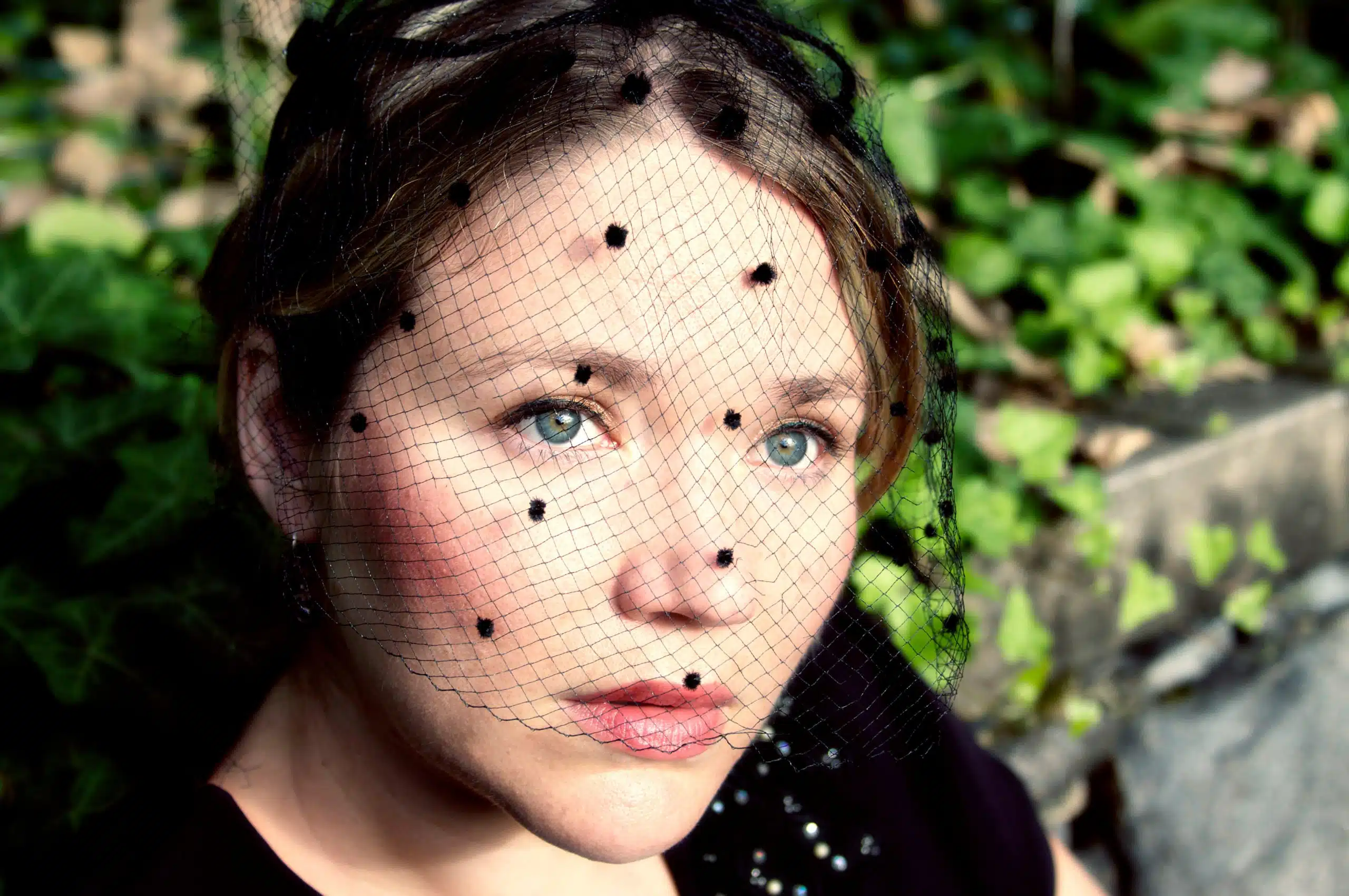
“Fair Eyes! The Mirror of My Mazed Heart” by Edmund Spenser
Fair eyes! the mirror of my mazed heart,
What wondrous virtue is contained in you,
The which both life and death forth from you dart,
Into the object of your mighty view?
For, when ye mildly look with lovely hue,
Then is my soul with life and love inspired:
But when ye lower, or look on me askew,
Then do I die, as one with lightning fired.
But, since that life is more than death desired,
Look ever lovely, as becomes you best;
That your bright beams, of my weak eyes admired,
May kindle living fire within my breast.
Such life should be the honour of your light,
Such death the sad ensample of your might.
“Did I Not Love Her as a Lover Ought” by Richard Linche
Did I not love her as a lover ought,
with purest zeal and faithfulness of heart;
Then She had cause to set my love at naught,
and I had well deserved to feel this smart!
But holding her so dearly as I do,
as a rare jewel of most high esteem;
She most unkindly wounds and kills me, so,
my ne’er-stained troth most causeless to misdeem!
Never did one account of woman more
than I of her! nor ever woman yet
Respected less, or held in lesser store
her lover’s vows, than She by mine doth set!
What resteth then? but I despair and die!
That so my death may glut her ruthless eye.
“Give Me My Heart! For No Man Liveth Heartless!” by Barnabe Barnes
Give me my Heart! For no man liveth heartless!
And now deprived of heart, I am but dead,
(And since thou hast it; in his tables read!
Whether he rest at ease, in joys and smartless?
Whether beholding him, thine eyes were dartless?
Or to what bondage, his enthralment leads?)
Return, dear Heart! and me, to mine restore!
Ah, let me thee possess! Return to me!
I find no means, devoid of skill and artless.
Thither return, where thou triumphed before!
Let me of him but repossessor be!
And when thou gives to me mine heart again;
Thyself, thou dost bestow! For thou art She,
Whom I call Heart! and of whom, I complain.

“My Love Is Like to Ice, and I to Fire” by Edmund Spenser
My love is like to ice, and I to fire;
How comes it then that this her cold so great
Is not dissolv’d through my so hot desire,
But harder grows the more I her entreat?
Or how comes it that my exceeding heat
Is not delay’d by her heart-frozen cold;
But that I burn much more in boiling sweat,
And feel my flames augmented manifold!
What more miraculous thing may be told,
That fire, which all things melts, should harden ice;
And ice, which is congeal’d with senseless cold,
Should kindle fire by wonderful device!
Such is the power of love in gentle mind,
That it can alter all the course of kind.
“Bright Star of Beauty! On Whose Eyelids Sit” by Michael Drayton
Bright Star of Beauty! on whose Eyelids sit
A thousand nymph-like and enamoured Graces,
The Goddesses of Memory and Wit,
Which there in order take their several places.
In whose dear Bosom, sweet delicious LOVE
Lays down his quiver, which he once did bear,
Since he that blessèd Paradise did prove;
And leaves his mother’s lap, to sport him there.
Let others strive to entertain with words!
My soul is of a braver mettle made:
I hold that vile, which vulgar Wit affords,
In me ’s that faith which Time cannot invade!
Let what I praise, be still made good by you!
Be you most worthy, whilst I am most true!
“But Thou, My Dear Sweet-Sounding Lute, Be Still!” by Richard Linche
But thou, my dear sweet-sounding lute, be still!
repose thy troubled strings upon this moss!
Thou hast full often eased me ’gainst my will:
lie down in peace, thy spoil were my great loss!
I’ll speak enough of her too cruel heart,
enough to move the stony rocks to ruth!
And cause these trees weep tears to hear my smart,
though cruel She will not once weigh my truth.
Her face is of the purest white and red,
her eyes are crystal, and her hair is gold.
The World, for shape with garlands crown her head,
and yet a tigress’ heart dwells in this mould.
But I must love her, Tigress! too too much!
Forced; must I love! because I find none such.

“Love’s Lunacy” by Michael Drayton
Why do I speak of joy, or write of love,
When my heart is the very den of horror;
And in my soul the pains of hell I prove,
With all his torments and infernal terror?
What should I say? What yet remains to do?
My brain is dry with weeping all too long.
My sighs be spent in uttering of my woe,
And I want words wherewith to tell my wrong.
But still distracted in Love’s lunacy,
And Bedlamlike, thus raving in my grief.
Now rail upon her hair, then on her eye,
Now call her “Goddess!” then I call her “Thief!”
Now I deny her! then I do confess her!
Now do I curse her! then again I bless her!
